Rainy Travel Log (VIII)
Mohammad Hussein Ghadami
Translated by: Fazel Shirzad
2019-8-27
It is time to go flooded area named Hamidiyeh. We get ready to move with one of comrades who came from Imam Mahdi Theological Seminary and was familiar with ways. Along the way, there is still talk and words about the area, and different dialogues:
- Obviously, there were sugar cane on the sidelines of Karun River in the past. Weren’t there?
-Yeah. Sugar cane was manufactured by hand and sold until the British came in Iran. Then Englishmen poured fish into the water with a poisonously and noxious bite- Amphibian fish with barbed back. When water went down, the fish would go in mud, and then when you put your feet in the mud, the barbs of fish would bite you; they was bruised first and then paralyzed. After that, the story of sugar cane and the import of sugar cane and etc. were raised.
With a question, the topic of speaking was turned into a rainy night when a village disappears!
-Have you heard the story of Koharang from Chaharmahal and Bakhtiari Province[1]? It's a strange story. One night there is heavy rain and a strange sound is spinning on air; as the villagers wake up in the morning, they found neighboring village disappeared!
- Wasn't it a thrust?
- No, there is no pebble in the valley at all. The mountain has risen and fallen on the village! Interestingly, the houses in neighboring villages were not damaged.
-when was it taken place?
-1377. I want to know how the valley was not damaged and moved?! The name of village is "Abkar Labud". You can see it on internet.
-Are there any someone to be survived?
-Why, just a school girl and a soldier were survived. The girl had gone to her aunt's house at the night before that accident.
-Some of villages were also disappeared in Rudbar’s[2] earthquake.
- Yes. It was a thrust.
As driver brake, our conversation was left unfinished, we find a flooded young man coming out of his tent and shelter, getting to the car quickly; happily invites us to his tent. Sayyid Shahabuddin Tabatabai says thanks to us.
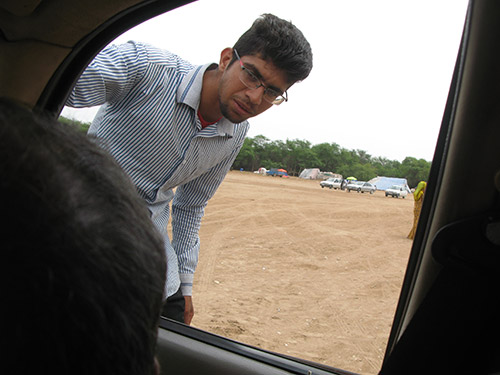
This is young man who greeted with us and said you were proud of us.
- Thank you so much. We are late, we have guests; we have to go somewhere. We promised to some ones. We must go back to the meeting before sunset. God willing, we will come back later, say best to family and friends.
That young man shakes hands.
- You raised our heads!
- What did he mean?
- That means you were proud of us.
We pass a lush green path, trees and river, plain and nice weather of that area, as well as the colorful tents of Red Crescent, which is the temporary shelter for the injured. Today is sunny and pleasure. But it is always a pleasure weather; sometimes it is so raining and windy day that there is no power to keep it. We pass next the large canals that are filled with grass and wildlife that no one try to clean it. If it was cleaned, floods would not harm people's lives!
We arrive at the endpoint, we become the guest of a flooded villager that takes his family to desert. During the floods and rains, his only means of transport was a small boat that carried him to front of stairs and home.
-When we were warned that it was going to flood, I took my family to desert. As I couldn't take my one-year-old kid outside, I had to spend nights on roof that had lots of painful mosquito. We were very bothered. Thank God we had no casualties.
He refers rivers and breakdowns;
-let's see! What does flood do in our lives? This is Karkheh River, our lands are destroyed, our products are submerged, and most of the damage is financial and agricultural.
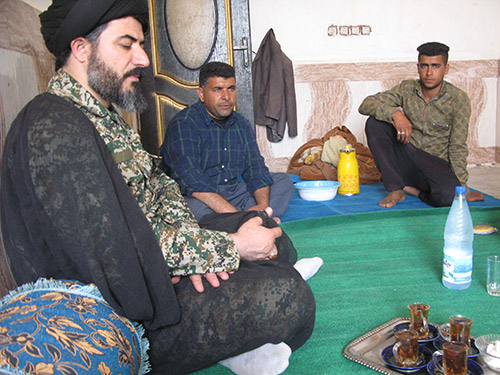
Drinking tea with old and slim waist cups
We are entered into the house by landlord insistently. We sit on an old and colorless carpet, drink tea and listen words from the feelings of his heart. For washing hand and face, you had to cross a narrow path behind the house, but an angry and big dog was sitting on the path. We hesitate a little further; we are looking for another place for washing hands and face. We ask a woman who was washing dishes, for a new place. She says with a smile:
-Don't be scared, that dog is blind and deaf! It is harmless.
He crosses in front of dog twice to make us sure.
-Look, it is harmless
She is right, the dog does neither notice her and nor us. We safely go back. The dog is still like a statue. How can a deaf and dumb dog guard for a landlord?!
Keyvan took the opportunity to start a conversation with the people around the house and around him, as well as an interview with Mr. Tabatabai, in front of the house and by the river.
-We are now on the edge of Karkheh River. Karkheh has many memories of resilient people of Khuzestan and Andimeshk; in those days, our heroic fighters were gathering in the Do Kuheh garrison to defend this water, soil, border and country.
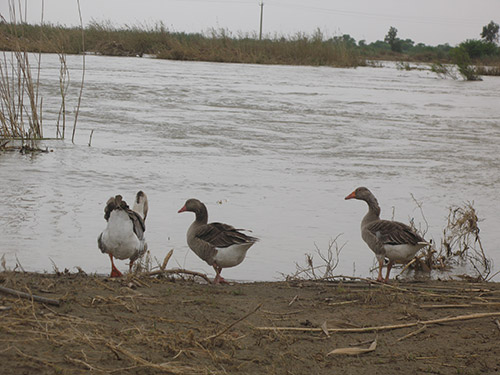
Only the geese were happy about flood and rain
Implicitly I separate from the crowd to hunt moments and photograph. I take a few photos of ducks on the bank of river and sea ducks, and we quickly arrive to the end of a dead end road where there was a small house with a large, enclosed lush garden and a variety of birds: Peacocks, parrots, ducks, turkeys, goats, etc. that have survived from flood and rain. It is so enjoyable to watch this scenery that I do not notice the passage of time; when I he find myself, I find that friends are going to travel.
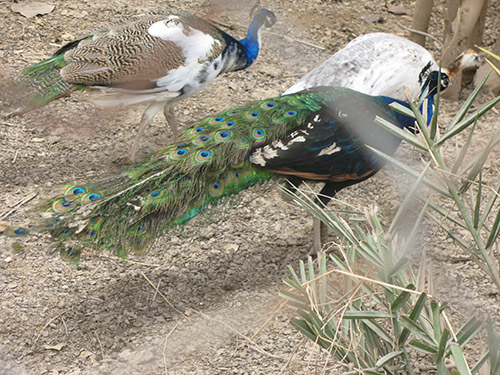
- We're going away; not to be left behind, hurry up!
It is sunset and sun is sinking into Karkheh River. We say goodbye to go Ahvaz. The last day, we walk along the bank of Karun River and remember the past.
-What days are passed for revolution? It was like yesterday when there was a large crowd gathered around the river.
-Yeah. I remember. Here was the center and station of militant groups and feudists. In the evening, they used to come here and discuss and make speech; they attracted members by exhibitions, photographs, leaflets and etc.
-This river, one day, will tell the story of its days.
We are not fan of shopping; the custom is that everyone go to market and buy souvenirs on the last day of trip, but the prices are high; we are not able to buy something. We come back.
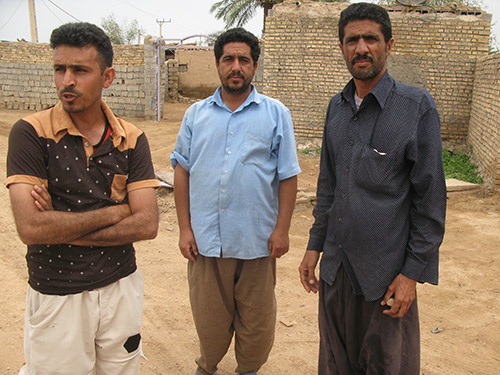
The latest photo with hosts who were looking forward to us.
[1] It is one of the 31 provinces of Iran. It lies in the southwestern part of the country. Its capital is Shahr-e Kord. The province was put as part of Region 2 upon the division of the provinces into 5 regions solely for coordination and development purposes on June 22, 2014.
[2] It is a city and capital of Rudbar County, Gilan Province, Iran.
Number of Visits: 4321








The latest
- The Artillery of the Islamic Revolutionary Guard Corps
- Translation in Oral History and Its Potential Pitfalls
- 100 Questions/14
- Third Regiment: Memoirs of an Iraqi Prisoner of War Doctor – 14
- Analysis and classification of oral literature of resistance using emerging technologies
- 100 Questions/13
- Preface and Introduction in Oral History Books
- Oral History of 40 Years
Most visited
- 100 Questions/13
- Preface and Introduction in Oral History Books
- Oral History of 40 Years
- Third Regiment: Memoirs of an Iraqi Prisoner of War Doctor – 13
- 100 Questions/14
- Analysis and classification of oral literature of resistance using emerging technologies
- Translation in Oral History and Its Potential Pitfalls
- Third Regiment: Memoirs of an Iraqi Prisoner of War Doctor – 14
100 Questions/8
We asked several researchers and activists in the field of oral history to express their views on oral history questions. The names of each participant are listed at the beginning of their answers, and the text of all answers will be published on this portal by the end of the week. The goal of this project is to open new doors to an issue and promote scientific discussions in the field of oral history.The Role of Objects in Oral Narrative
Philosophers refer to anything that exists—or possesses the potential to exist—as an object. This concept may manifest in material forms, abstract notions, and even human emotions and lived experiences. In other words, an object encompasses a vast spectrum of beings and phenomena, each endowed with particular attributes and characteristics, and apprehensible in diverse modalities.100 Questions/6
We asked several researchers and activists in the field of oral history to express their views on oral history questions. The names of each participant are listed at the beginning of their answers, and the text of all answers will be published on this portal by the end of the week. The goal of this project is to open new doors to an issue and promote scientific discussions in the field of oral history.The Importance of Pre-Publication Critique of Oral History Works
According to the Oral History website, a meeting for critique and review of the book “Oral History: Essence and Method” was held on Monday morning, November 10, 2025, with the attendance of the book’s author, Hamid Qazvini, and the critics Mohammad Qasemipour and Yahya Niazi, at the Ghasr-e Shirin Hall of the National Museum of the Islamic Revolution and Sacred Defense.

